Books
Books

Two Augusts In A Row In A Row
The seventh book in Publication Studio's Fellow Travelers Series, is a love letter between generations of queer people. Set in New York City in 2001, we follow Phillip—a gender subversive drag king in search of grace and magic—through rich, sad, humorous language that is singularly Shelley Marlow's.
Kevin Killian writes, "I've been dying for something first rate and innovative and have found this in Marlow's writing. Her hero, Phillip/Philomena...is the most enchanting and elusive central character in a novel since Cassandra in Dodie Smith's Capture the Castle. While many have compared Marlow to the late Jane Bowles, I would agree if only there was a loving and empathetic Jane Bowles, and now there is and here is her book."
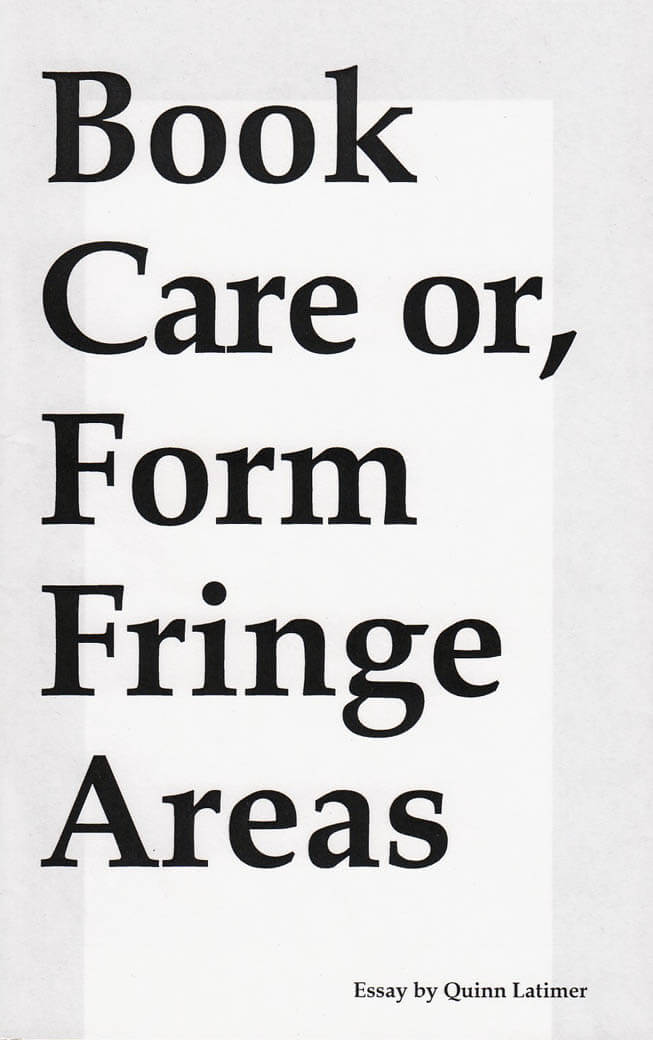
Best Book Don't Care Or, Poor Form From Fringe Areas
An essay on the forms or purposes of writing, books and libraries. Or as Quinn Latimer wrote: 'There is a relatively well-known workshop at Werkplaats Typografie, the school for design in Arnhem, Netherlands, called 'Best Books'. This past year the school asked the artist Sophie Nys to lead this course. In due time, Nys wrote König and asked if she might bring her students from the workshop to Cologne to discuss his work with books in the space of his own bookstore. She added that since he likely didn’t have enough chairs for all of her students, they would bring their own. König agreed. Then she asked her students to each pick their favorite book. They did so. Then she asked these students to design a chair inspired by that volume. An inspired idea. Strange—and useful. Thus 16 pieces of furniture suggested and elliptically inspired by specific books were built, a kind of living library of booklike creations, as another Walter might put it. The students went to see Herr König, stools in hand, their library entering his. I heard from Sophie in our email correspondence and singular Skype conversation that it was a wonderful visit. I even saw some pictures from that day. After the students returned to Arnhem, and for the final part of the project, they decided to make a publication. This is where I—and the text you are reading now—enter the picture, as they say.'

Dedication(s)
‘To C.L.S.’, ‘For A.L.M.’, ‘In Memory of J.V.C.’ – Starting from his collection of three-letter dedications, Robin Waart’s new artist book "Dedication(s)" looks at public yet hidden modes of address. While these dedications appear in printed books, they remain private, intimate allusions between author and intended recipient. The project infers the strange position of the reader who encounters these cryptic dedications, which perhaps get in the way of—or better clarify?—the relationship between author and audience. Waart’s project questions the relationship between a work and the reality in which it comes about, and why, and for whom, we make what we make.
2018, book publication, offset and watermark on paper, edition of 800, 26 x 20.3 x 0.65 cm
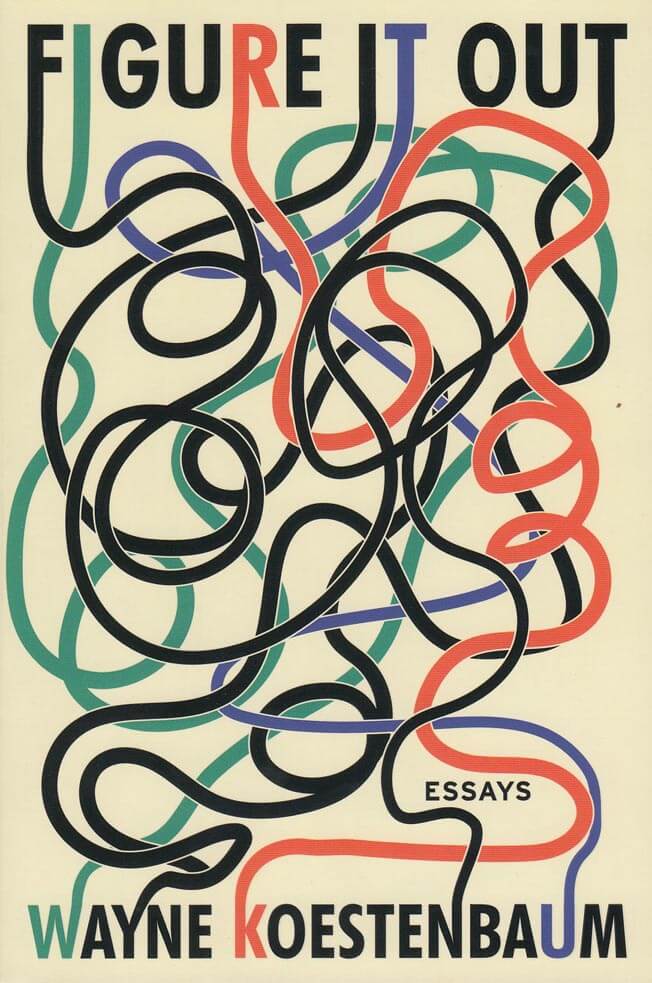
Figure It Out
'Toward what goal do I aspire, ever, but collision? Always accident, concussion, bodies butting together. By collision I also mean metaphor and metonymy: operations of slide and slip and transfuse.' In his new nonfiction collection, poet, artist, critic, novelist, and performer Wayne Koestenbaum enacts twenty-six ecstatic collisions between his mind and the world. A subway passenger's leather bracelet prompts musings on the German word for stranger; Montaigne leads to the memory of a fourth-grade friend's stinky feet.
Koestenbaum dreams about a hand job from John Ashbery, swims next to Nicole Kidman, reclaims Robert Rauschenberg's squeegee, and apotheosizes Marguerite Duras as a destroyer of sentences. He directly proposes assignments to readers: Buy a one-dollar cactus, and start anthropomorphizing it. Call it Sabrina. Describe an ungenerous or unkind act you have committed. Find in every orgasm an encyclopedic richness. Reimagine doing the laundry as having an orgasm, and reinterpret orgasm as not a tiny experience, temporally limited, occurring in a single human body, but as an experience that somehow touches on all of human history. Figure It Out is both a guidebook for, and the embodiment of, the practices of pleasure, attentiveness, art, and play.
May 2020

Toxicon and Arachne
In Toxicon & Arachne, McSweeney allows the lyric to course through her like a toxin, producing a quiver of lyrics like poisoned arrows. Toxicon was written in anticipation of the birth of McSweeney's daughter, Arachne. But when Arachne was born sick, lived briefly, and then died, McSweeney unexpectedly endured a second inundation of lyricism, which would become the poems in Arachne, this time spun with grief. Toxicon & Arachne is the culmination of eight years of engagement with lyric under a regime of global and personal catastrophes.

Slow Tongue
Slow Tongue is the debut writing and poetry collection from Olivia Douglass. A verse-essay/lyric essay hybrid examining race, sexuality and the relationship between Black women artists. 'Slow Tongue' is a response to the writings of M. NourbeSe Philips 'She Tries Her Tongue Her Silence Softly Breaks', and works to continue the decolonisation of language and imagery.
Each piece may be taken individually, but it is through looking at their positioning amongst each other that something more comprehensive, provocative and challenging comes together.
Written and designed by Olivia Douglass
Cover illustration by Jack Tongeman
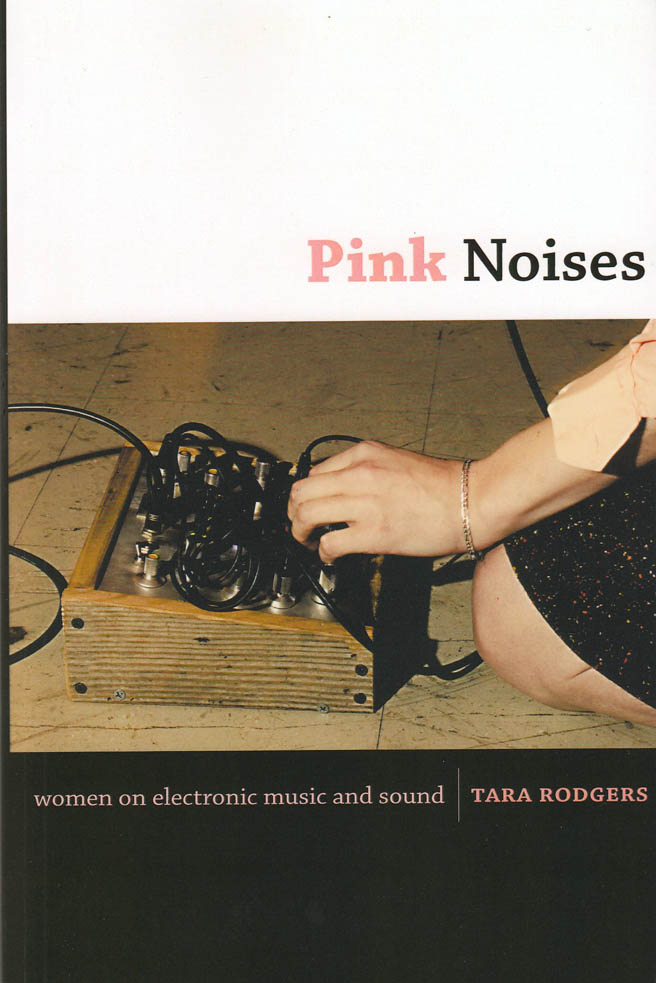
Pink Noises
Pink Noises brings together twenty-four interviews with women in electronic music and sound cultures, including club and radio DJs, remixers, composers, improvisers, instrument builders, and installation and performance artists. The collection is an extension of Pinknoises.com, the critically-acclaimed website founded by musician and scholar Tara Rodgers in 2000 to promote women in electronic music and make information about music production more accessible to women and girls. That site featured interviews that Rodgers conducted with women artists, exploring their personal histories, their creative methods, and the roles of gender in their work. This book offers new and lengthier interviews, a critical introduction, and resources for further research and technological engagement.

Dyke (geology)
Through intertwined threads of autofiction, lyric science writing, and the tale of a newly queer Hawaiian volcano, Sabrina Imbler delivers a coming out story on a geological time scale. This is a small book that tackles large, wholly human questions—what it means to live and date under white supremacy, to never know if one is loved or fetishized, how to navigate fierce desires and tectonic heartbreak through the rise and eventual eruption of a first queer love.
Sabrina Imber's DYKE (GEOLOGY) is not only gorgeous, it is wildly transformative. It contains sentences that mimic the Earth itself: craggy, pitted, alive. There is so much movement, a momentum that sweeps readers along sentence by sentence. The structures Imbler builds are deeply affecting, deeply moving. The heart of it sits exposed, bare and beating, pulsing and insistent. This writing is very queer, very loving, very painful, very poignant. It is revolutionary work."—Kristen Arnett
"Imbler queers the history of the world here—a thrilling summer romance set to geological time, unlike any I know, spanning the globe and the history of humanity and the space between two dyke hearts. Play in the waves of this mind and emerge renewed."—Alexander Chee
Sabrina Imbler is a half-Chinese writer and dyke based in Brooklyn. She is a staff writer for Atlas Obscura and the recipient of fellowships from Jack Jones Literary Arts, the Asian American Writer's Workshop, and Paragraph NY. Sabrina wrote the monthly "My Life in Sea Creatures" column at Catapult and her essay collection How Far the Light Reaches is forthcoming from Little, Brown in 2021.
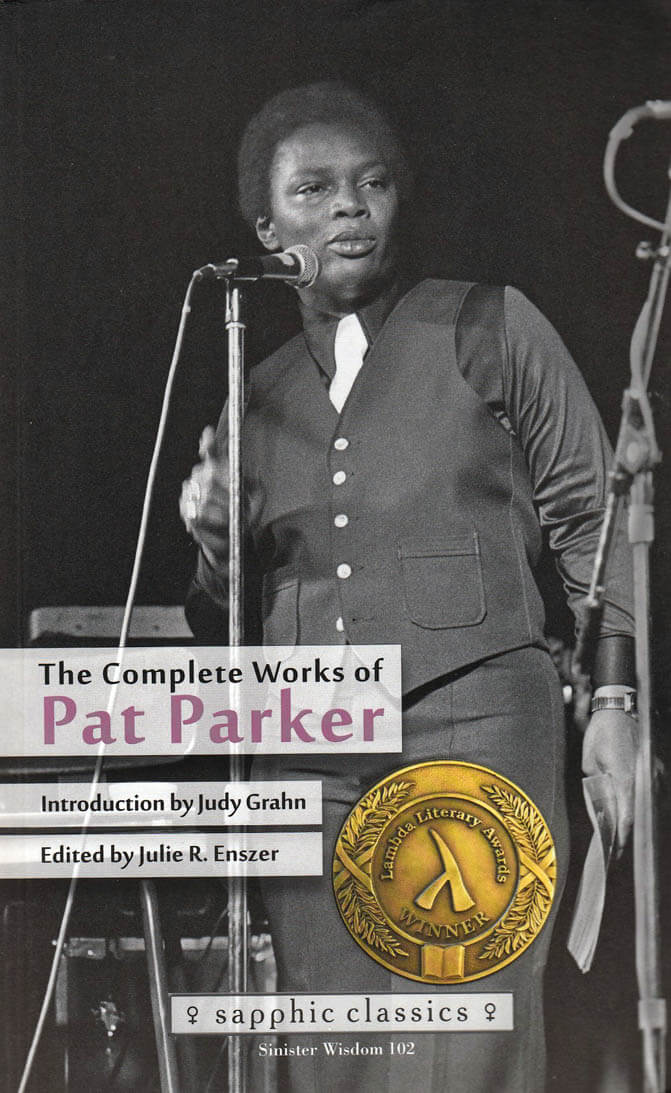
The Complete Works of Pat Parker
A Midsummer Night’s Press and Sinister Wisdom are pleased to announce the publication of Sinister Wisdom 102: The Complete Works of Pat Parker with a new introduction by poet and scholar Judy Grahn; an afterword by volume editor Julie R. Enszer, with extensive notes on the poems; photographs of Parker and a bibliography.
'In The Complete Works of Pat Parker, we have a trove of her artistic and political engagements-poetry and stories and plays and speeches; these are not separate realities. They intertwine in her now classic works, Movement in Black (1978), Womanslaughter (1978), and Jonestown & Other Madness (1985). But here too are less celebrated and uncollected works, plays especially, that show off Parker’s willingness to experiment, to push us towards more politicized realities.' - Alexis de Veaux
Included in Sinister Wisdom 102: The Complete Works of Pat Parker are Parker’s masterwork, Movement in Black, as well as Jonestown & other madness. Parker’s prose writing is collected in The Complete Works along with two unpublished plays and a number of previously uncollected poems. Editor Julie R. Enszer notes, “The breadth of creative output collected here demonstrates the seriousness of Parker’s overall work as a writer. Beginning in 1963, when she was nineteen years old, and continuing until she died in 1989, Parker took her work as a writer seriously. Gathering as much of it as possible into a single volume invites readers to take it seriously as well.”

March
March brings together poems and performance texts by Nathalie Rozanes, as well as a conversation with Elizabeth Ward and Tarek Halaby.
'Maybe I have never made a performance that was not about identification and its complexity. About positioning oneself. Maybe I have never made a piece that is not about how one thing leads to another. Maybe I have never made a piece that is not about process. (...)'
Published May 2020.

Beauty Kit
BEAUTY KIT – AN ECO-EROGENOUS ART PROJECT by Isabel Burr Raty with contributions by Kristin Rogghe, Elke Van Campenhout, Gosie Vervloessem, Pablo Diartinez and Tim Vets, is an experimental catalog summarizing Isabel Burr Raty’s research on conceptualizing and manufacturing eco-erogenous para-pharmaceutical products. It tells the story of the BKFF, a mobile farm where she and other females harvest their orgasmic juices to produce beauty bio-products, used for treatments in the BK Spa, critically discussed in the BK Focus Group and moving forward into becoming a village, where every-body harvests each other. The catalog comes with contributing text, “Harvesting bodies – The Farm as Paradox” by Elle/Elke Van Campenhout, and other reflections on the project.
Isabel Burr Raty is a Belgian-Chilean artist, filmmaker, and Media Art History teacher in ERG (École de Recherche Graphique), living between Brussels and Amsterdam. She is currently developing her second feature film, about the colonial impact on Easter Island, and creating live art and new media installations that queer production understandings, such as the Beauty Kit Project. Her works have been shown internationally.
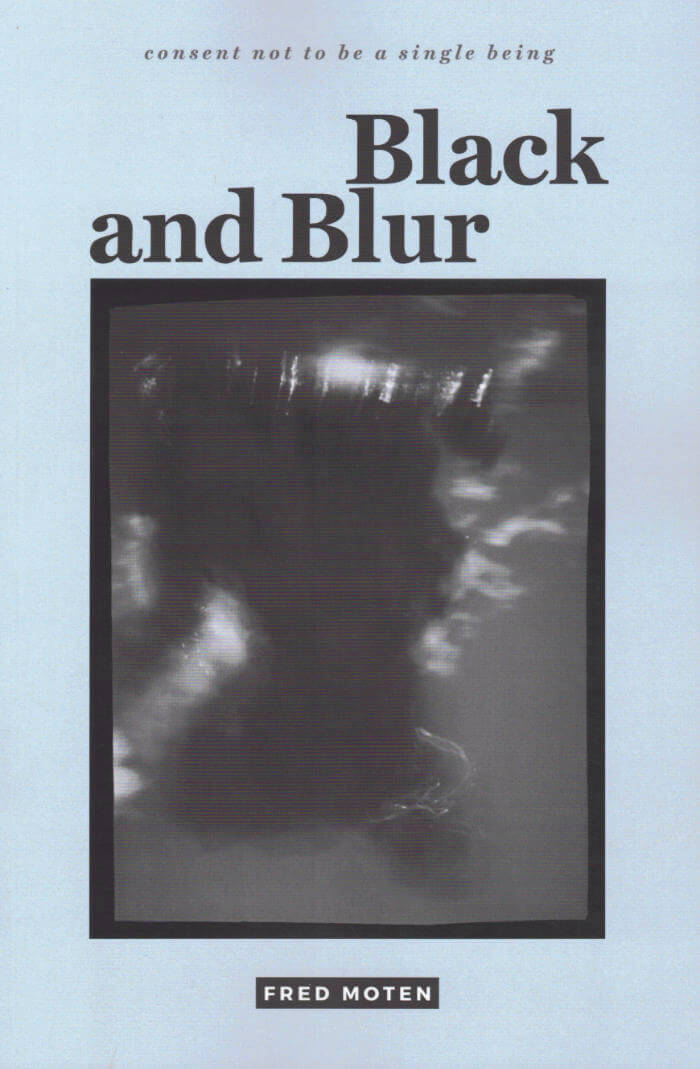
Black and Blur
In Black and Blur—the first volume in his sublime and compelling trilogy consent not to be a single being—Fred Moten engages in a capacious consideration of the place and force of blackness in African diaspora arts, politics, and life. In these interrelated essays, Moten attends to entanglement, the blurring of borders, and other practices that trouble notions of self-determination and sovereignty within political and aesthetic realms.
Black and Blur is marked by unlikely juxtapositions: Althusser informs analyses of rappers Pras and Ol' Dirty Bastard; Shakespeare encounters Stokely Carmichael; thinkers like Kant, Adorno, and José Esteban Muñoz and artists and musicians including Thornton Dial and Cecil Taylor play off each other. Moten holds that blackness encompasses a range of social, aesthetic, and theoretical insurgencies that respond to a shared modernity founded upon the sociological catastrophe of the transatlantic slave trade and settler colonialism. In so doing, he unsettles normative ways of reading, hearing, and seeing, thereby reordering the senses to create new means of knowing.
Fred Moten is Professor of Performance Studies at New York University and the author of B Jenkins, also published by Duke University Press, In the Break: The Aesthetics of the Black Radical Tradition, and coauthor of The Undercommons: Fugitive Planning & Black Study.
(Dec 2017)

We Both Laughed in Pleasure
Drawn from Lou Sullivan’s meticulously kept journals, this landmark book records the life of arguably the first publicly gay trans man to medically transition.
We Both Laughed In Pleasure: The Selected Diaries of Lou Sullivan narrates the inner life of a gay trans man moving through the shifting social, political, and medical mores of the second half of the 20th century. Sullivan kept comprehensive journals from age eleven until his AIDS-related death at thirty-nine. Sensual, lascivious, challenging, quotidian and poetic, the diaries complicate and disrupt normative trans narratives. Entries from twenty-four diaries reveal Sullivan’s self-articulation and the complexity of a fascinating and courageous figure.
Edited by: Ellis Martin and Zach Ozma
Introduction by: Susan Stryker

O Fortuna
In 2015, Jacob finds himself wandering the streets, swamps and cemeteries of New Orleans. Through his search for a man named Ignatius, 'O Fortuna' tells the story of his attempt to make a film. We discover the city’s unique atmosphere and meet a bizarre cast of characters who assist Jacob with his uncertain attempts at shooting scenes of DAT LIKWID LAND.

All That Beauty
A pathbreaking new volume of poems from Fred Moten, All That Beauty combine's Moten's penchant for lyrical prosody, radical thought, and African American theory to produce writing unlike any other poetry in the world: "What is it to reside without settling? Is that is or is that ain't like being stuck in sweetness, held in life?"
"The line between Fred Moten’s theory and poetry is increasingly cloudy; the distinction almost seems (but isn’t quite) irrelevant. In All That Beauty, his new poetry collection, the poems come closer than ever before to the capacious, disorienting density of his prose writing: not just for their hairpin turns of speculative reasoning, or even their gleeful embrace of specialized academic terminology, but because they are strewn with names, citations and allusions that situate the text in a range of discourses – from Black studies to sound studies to the philosophy of maths." —Steven Zultanski
(Published 2019.)
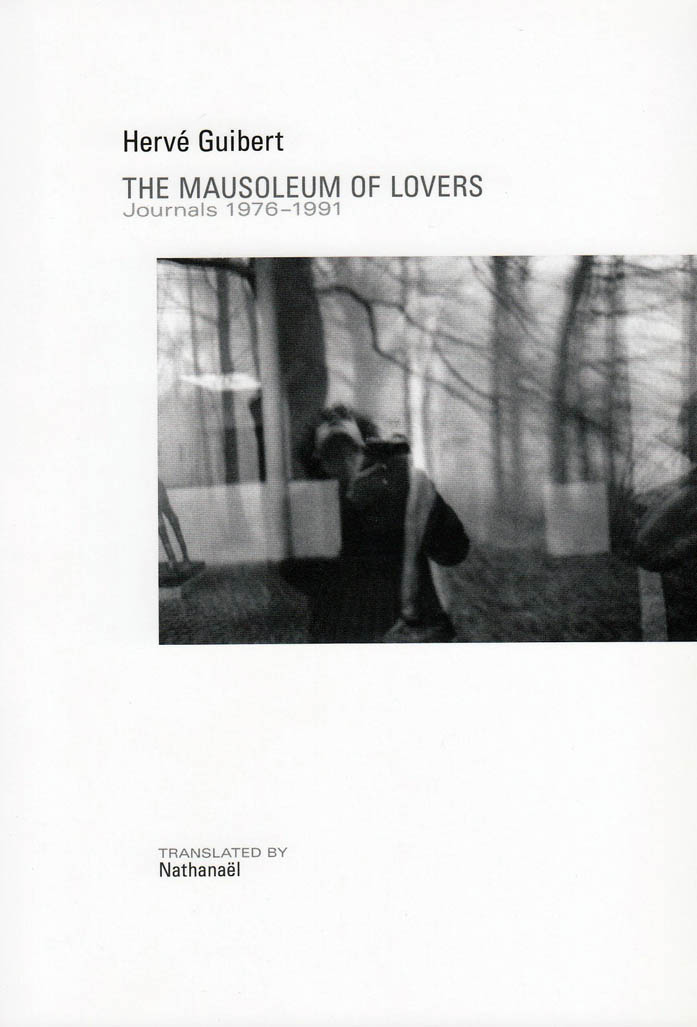
The Mausoleum of Lovers: Journals 1976 - 1991
The Mausoleum of Lovers comprises Guibert's journals, kept from 1976-1991. Functioning as an atelier, it forecasts the writing of a novel, which does not materialize as such; the journal itself — a mausoleum of lovers — comes to take its place. The sensual exigencies and untempered forms of address in this epistolary work, often compared to Barthes' A Lover's Discourse, use the letter and the photograph in a work that hovers between forms, in anticipation of its own disintegration.
HERVÉ GUIBERT (1955-1991) was a French writer and photographer. A critic for Le Monde, he was the author of some thirty books, most notably To the Friend Who Did Not Save My Life, which presents an intimate portrait of Michel Foucault and played a significant role in changing public attitudes in France towards AIDS. NATHANAËL is the author of a score of books written in English or French, including Sisyphus, Outdone. Her translations include books by Édouard Glissant and Danielle Collobert, among others. Nathanaël lives in Chicago.
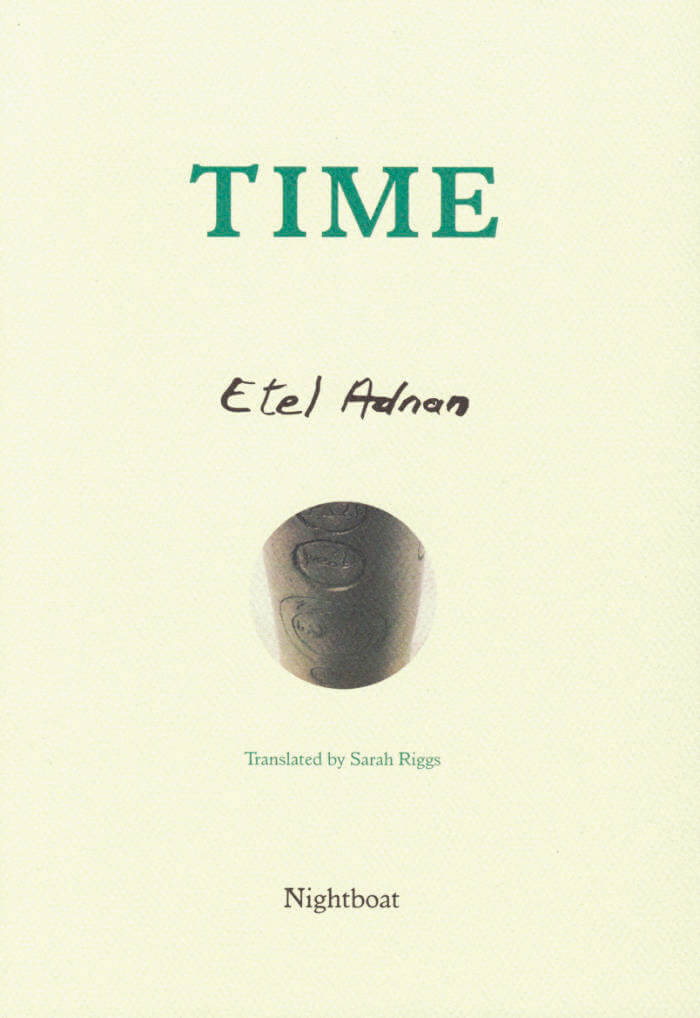
Time
On October 27, 2003, Etel Adnan received a postcard from poet Khaled Najar, who she had met in the late seventies. Originally in French, the poems it sparked collapse time, then expand it. War and love intertwine with coffee and bombs, memory and the present, evoking life in non- linear time.
Time continues Etel Adnan's recent series of short meditative works on single themes: Sea & Fog, Night, Surge and now Time, expanding her already rich philosophical and poetic lexicon. This book is a collection of six short works originally written in French.
(June 2019)
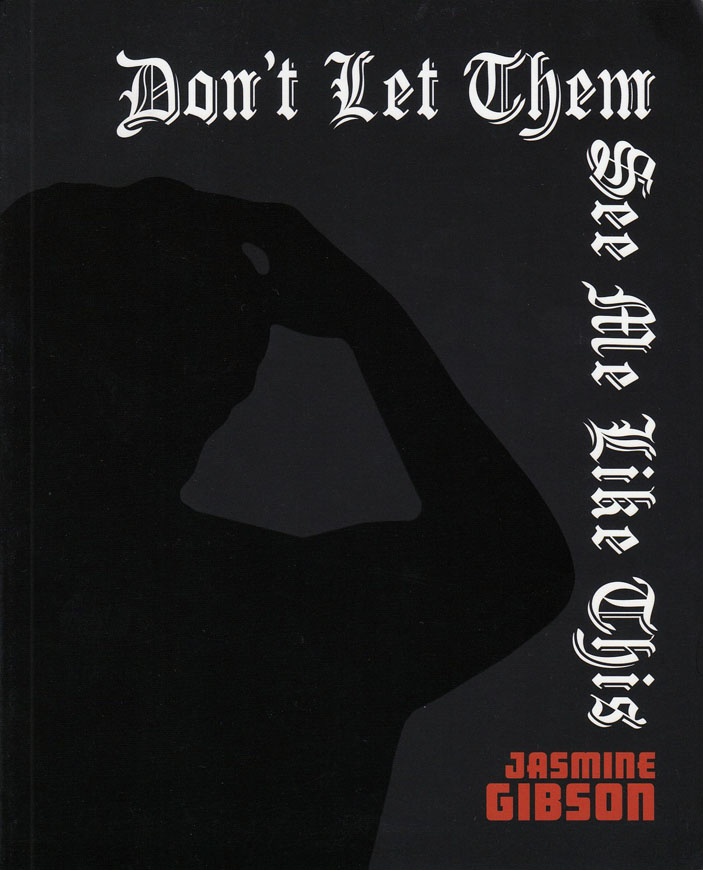
Don't Let Them See Me Like This
In Don't Let Them See Me Like This, Jasmine Gibson explores myriad intersectional identities in relation to The State, disease, love, sex, failure, and triumph. Speaking to those who feel disillusioned by both radical and banal spaces and inspired/informed by moments of political crisis: Hurricane Katrina, The Jena Six, the extrajudicial executions of Black people, and the periods of insurgency that erupted in response, this book acts as a synthesis of political life and poetic form.
JASMINE GIBSON is a Philly jawn based in Brooklyn. She spends her time thinking about sexy things like psychosis, desire, and freedom. She is the author of the chapbook Drapetomania.
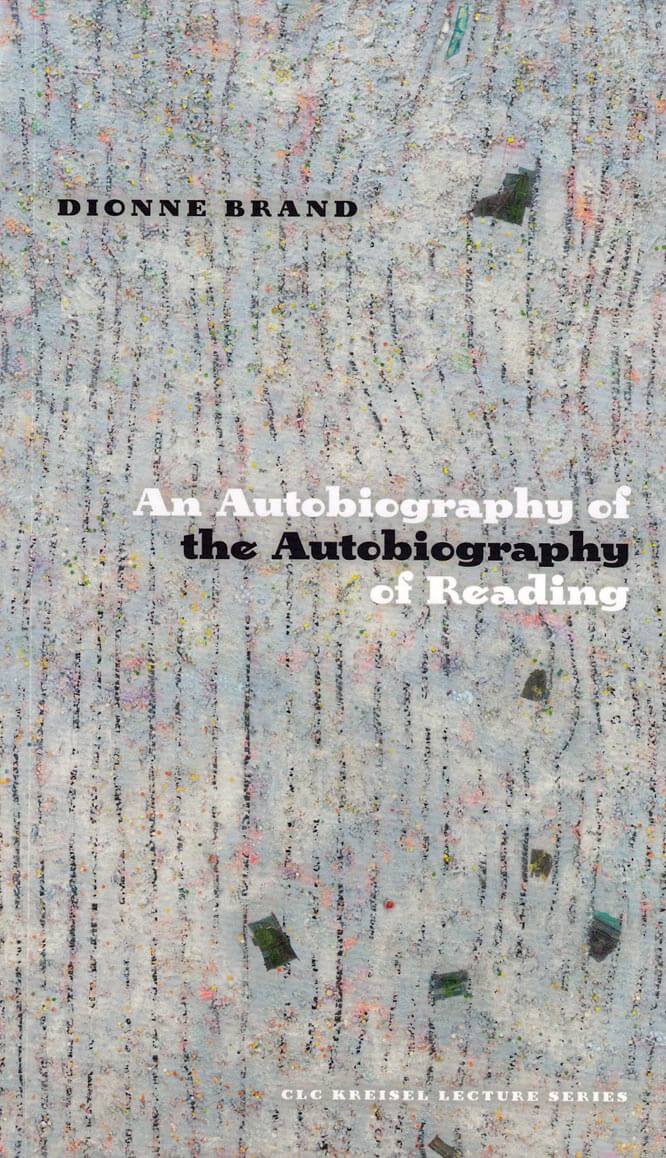
An Autobiography of the Autobiography of Reading
"The geopolitics of empire had already prepared me for this...coloniality constructs outsides and insides, worlds to be chosen, disturbed, interpreted and navigated - in order to live something like a real self."
Internationally acclaimed poet and novelist Dionne Brand reflects on her early reading of colonial literature and how it makes Black being inanimate. She explores her encounters with colonial, imperialist, and racist tropes; the ways that practices of reading and writing are shaped by those narrative structures; and the challenges of writing a narrative of Black life that attends to its own expression and its own consciousness.

The Black Condition Ft. Narcissus
The Black Condition ft. Narcissus is preemptive memoir, documenting the beginning of the author's gender transition and paralleling the inauguration of our latest Administration. These poems speak to and from fears holed up inside while contextualizing the cosmic impacts of our political landscape. Ranging from autobiographic melancholy to rigorously meditative, here is a necessary voice to process the world, predicated on unknowable desire and blossoming tragedy.
jayy dodd is a blxk trans femme from Los Angeles. They are a literary & performance artist. their work has appeared / will appear in Broadly, The Establishment, Entropy, LitHub, BOAAT Press, Duende, & The Poetry Foundation among others. they're the Workshops Director for Winter Tangerine, editor of A Portrait in Blues (Platypus Press 2017), author of Mannish Tongues (Platypus Press 2017) & The Black Condition ft. Narcissus (Nightboat Books 2019). their work has been featured in Teen Vogue & Entropy. they are also a volunteer gender-terrorist & artificial intellectual. find them talking trash online or taking a selfie.
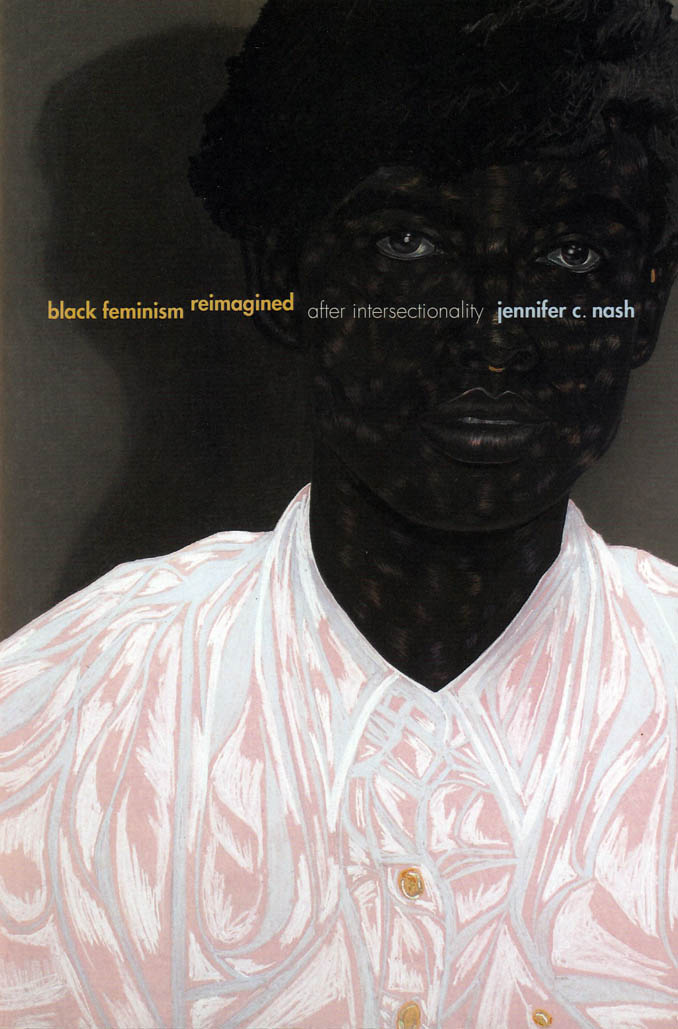
Black Feminism Reimagined
In Black Feminism Reimagined Jennifer C. Nash reframes black feminism's engagement with intersectionality, often celebrated as its primary intellectual and political contribution to feminist theory. Charting the institutional history and contemporary uses of intersectionality in the academy, Nash outlines how women's studies has both elevated intersectionality to the discipline's primary program-building initiative and cast intersectionality as a threat to feminism's coherence. As intersectionality has become a central feminist preoccupation, Nash argues that black feminism has been marked by a single affect—defensiveness—manifested by efforts to police intersectionality's usages and circulations. Nash contends that only by letting go of this deeply alluring protectionist stance, the desire to make property of knowledge, can black feminists reimagine intellectual production in ways that unleash black feminist theory's visionary world-making possibilities.
(March 2019)

Dear Angel of Death
Half poems, half prose, Dear Angel of Death braids intimate and public thinking about forms of togetherness. Is one woman a mother, a person in an artworld, a "black"? What imaginary and real spirits are her guides? The title essay proposes disinvestment in the idea of the Music as the highest form of what blackness "is" and includes many forms: philosophical divergence on the problem of folds for black life, a close reading of Nathaniel Mackey's neverending novel From a Broken Bottle Traces of Perfume Still Emanate, and an impassioned defense-cum-dismissal of contemporary hip hop's convergence with capitalism. - publishers note.
Simone White is the author of DEAR ANGEL OF DEATH (Ugly Duckling Presse), OF BEING DISPERSED (Futurepoem), and House Envy of All the World (Factory School), and the chapbooks Unrest (Ugly Duckling Presse) and Dolly (with Kim Thomas; Q Avenue). Recent poems and prose have appeared in BOMB, New York Times Book Review, Harper's, and Frieze. In 2017, she received the Whiting Award for poetry. She teaches at the University of Pennsylvania and lives in Brooklyn.
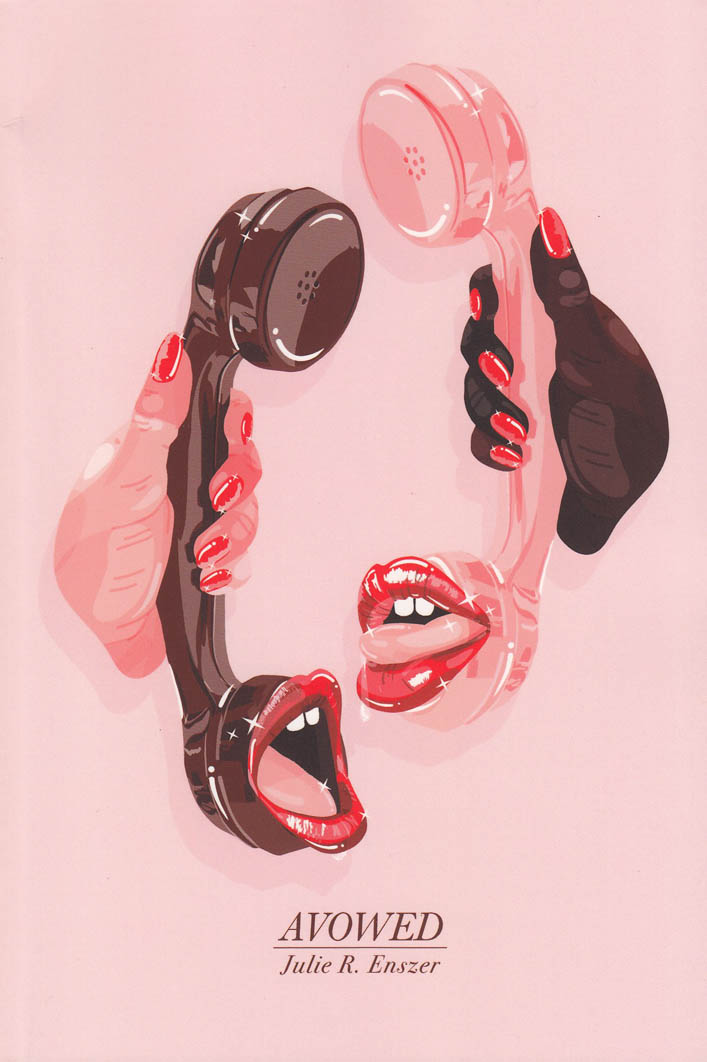
Avowed
The poems in Avowed explore aspects of a contemporary lesbian life within a committed relationship and as a citizen in the larger community. The narrator celebrates ("We break a glass. Mazel tov! We cry.") and mourns her losses ("Sometimes, between three and four a.m./on a break from her game/of bridge, your dead mother visits."). Riffing on Jewish liturgy, the feminist declares "everyday/I thank God/I was born a woman." Avowed delivers a complex, sustained vision of intimate partnership while celebrating the political changes that have secured LGBTQ visibility. - Robin Becker, author of Tiger Heron
'Avowed asks the critical question, "Is paper all that makes a marriage?" For the queer bride in a long-term relationship, the answer is as hard-won as the right to marry. Julie R. Enszer explores the bittersweet journey of a lesbian couple's struggle through the happily ever after with an edgy and humorous perspective that dares to share deep truths about desire, sex, and love. - Rigoberto GonzAlez, author of Unpeopled Eden
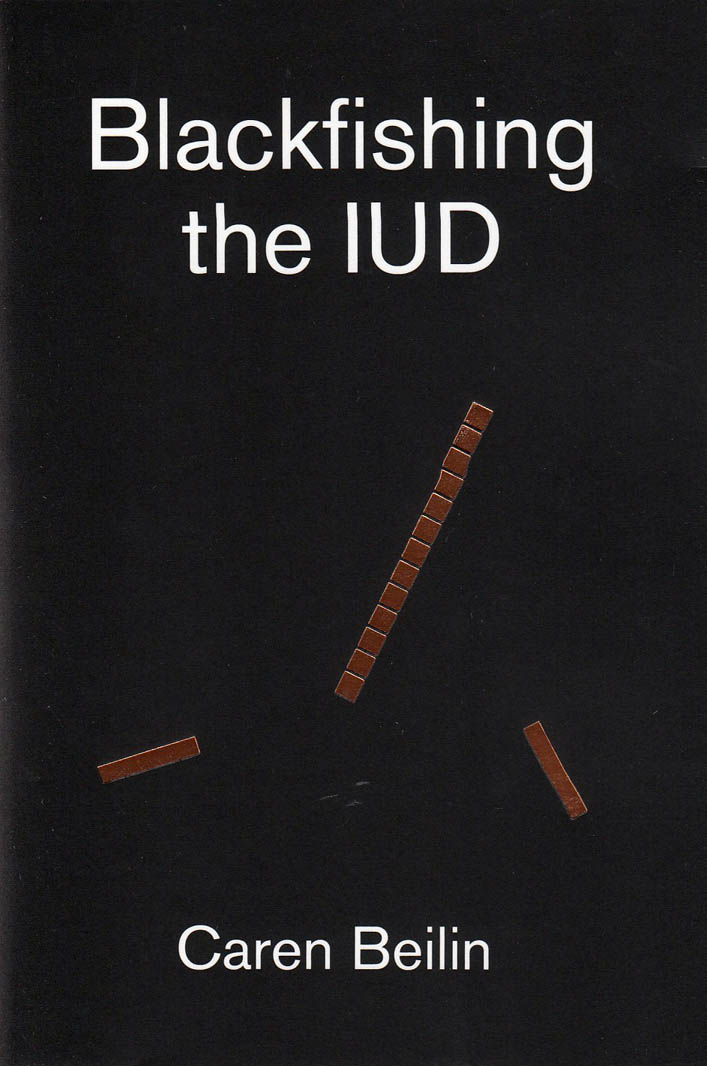
Blackfishing the IUD
Blackfishing the IUD is a daring and demanding memoir by author, Caren Beilin, about reproductive health and the IUD, gendered illness, medical gaslighting, and activism in the chronic illness community. Rhapsodic and unabashedly polemical, Beilin scrutinizes the literary, artistic, and medical history of Rheumatoid Arthritis, as she considers the copper IUD's role in triggering her sudden onset of chronic autoimmunity. As the title makes abundantly clear, the book is an argument that the copper IUD is sickening quite a lot of women—and that we listen first and foremost to women's testimony to begin to resolve it.
As I read I thought of alchemy, Beilin is an alchemist. She transmutes metal, in this case copper, into something that flames and sings and questions and fights. It's a supranatural work that quests after healing but also finds and makes sense in its paradoxes."—Johanna Hedva